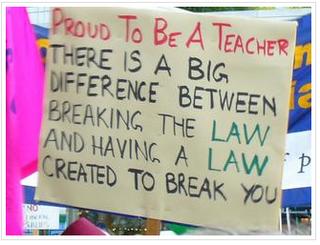As I thought about the past 2 weeks, I have mixed feelings about it all. Firstly, I am surprised by the power of the workers union who can single-handedly bring down basic services in the city. The 38000 teachers from the BCTF were supported by CUPE (Canadian Union of Public Employees) which boasted 470, 000 people. Friday saw a bigger impact when CUPE went into action. All mainland Vancouver libraries were shut. Public facilities like swimming pools, Universities and other public services like transportation. Some questions I asked:
#1 - Was it about Money?
Initially I thought it was. Now I think it is more than money. For the duration of the 2 week strike, the provincial government need not pay the teachers at all, resulting in a savings of CAD160 million dollars. The resultant minor salary adjustment was considered too small to make any impact in terms of bottom line. For the teachers, they lost half months of salary but gained a small victory in standing up for their principles. For the government, it was a $160 million savings and not budging much from their initial positions. In a nutshell, the teachers have helped to refinance their own stikes. No strike pay (courts banned the $50 per strike-day pay), losing half month of salary and on top of it, their union getting fined CAD500,000. that is a big financial sacrifice on the part of the teachers. WINNER: Government.
#2 - Was it about the kids?
Partially. If it was for the kids, provisions should have been made specifically to help needy parents and children to do so, though it might have reduced the impact of the strike itself. WINNER: Nobody.
#3 - So What was it all about?
Basically the rights. The right to be heard. The right not to be overrun by unjust policies. The right to strike. Nothing seemed more important than the right to their perceived way of living. That is the culture in British Columbia. WINNER: Nobody
 The picture is the perception of the government infringing on the rights of the teachers.
The picture is the perception of the government infringing on the rights of the teachers. #4 - What are the Lessons Learnt?
I think human relationships are ultimately the key to resolving anything. The mediator, Mr Vince Ready, reputed to have successfully ended 7000 disputes, including this recent Teachers' Strike), put up a simple 7-page proposal to both the government and the Teachers Federation. Based on this proposal, both parties agreed to move on to engage one another at a future time. Meanwhile work needed to be done. Three observations I can make:
A) MEDIATION
- We need to recognize that it is easy to take radical positions when tempers and emotions are high. We need people who are willing to put aside their own biasness, and take a neutral stance in order to bring different parties together. Positions of compromise may eventually be the result that nobody is truly satisfied. But that is the fact of an imperfect world, an imperfect society. We need to have more emphasis on Reconciliation.
B) RESTRAINT
- Never be too quick to move into the last resort. It will leave one no way out. When the stakes are upped, it will make negotiations more confrontational and difficult to back down without a loss of face.
C) PRICE
- A price has to be paid, and the teachers have paid a heavy price. When we fight for certain principles, we need to be prepared to do so. That is the difference between a pragmatic mindset versus an idealistic mindset. The former will do the sums and make decisions based on bread-and-butter. If the sums are not right, principles can wait. What happens when some event or some party forces us or our organization to 'deny our beliefs' or starve? Do we do our sums and avoid punishment?

In any confrontation, there are no winners. In any
As Christians, we can learn from the 3 observations. We are called to be bridges to strengthening relationships. Jesus prayed that we may be one. We need to develop skills of mediation among fellow believers, and then to fellow human beings. Secondly, We need to be flexible, and not to place ourselves on the throne so easily. We are imperfect and must be prepared to concede our weaknesses. Giving in a little is better than surrendering our entire inventory. Showing a little flexibility always takes some heat off from an explosive situation. The crux comes when our basic beliefs are threatened. In situations like these, we need to exercise wisdom like Jesus, when he was constantly tempted and tested by the Pharisees and the Sadducees. The law is one thing. the spirit of the law is another. It is ultimately the attitude of the heart and the relationships that determines the courses of actions.
kianseng
No comments:
Post a Comment